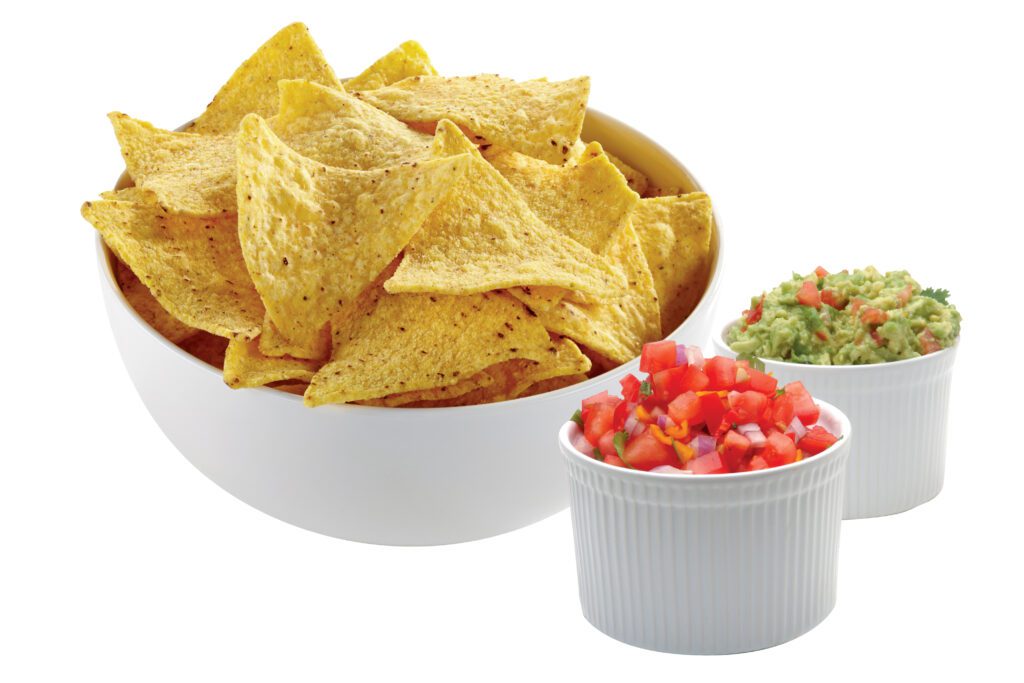Choosing the Healthiest Option
With one of the loveliest times of the year upon us, football fans are coordinating schedules, wiring the surround sound, and busting out Ro-Tel recipes. When tailgating parties abound, so do the less-than-healthy food choices. So Chattanooga nutritionist Pam Kelle offers her expert advice on how to choose the healthiest tailgate snacks.
Tortilla vs. Potato Chip
When comparing these two, there are a few things to consider. First, as Kelle explains, “From a calorie standpoint, tortilla chips have about 80 more calories per serving then potato chips.
But typically there is more fat in potato chips and more sodium in tortilla chips.” That means that if you’re trying to lower your sodium intake, then plain potato chips may be your winner. If weight is a concern, then maybe opt for the tortilla chips.
Generally, potato chips average approximately 542 calories per 100 grams, while tortilla chips are approximately 465 per 100 grams.


For comparison, sodium amounts are approximately 480 milligrams per 100 grams for potato chips and almost double for tortilla chips at 856 milligrams. But for fat content, potato chips outweigh tortilla chips with 36 grams to tortillas’ 15 grams per 100 grams.
A final factor to consider is that tortilla chips are more often used for dipping than for eating plain. If you choose healthier dip options with tortillas, you will potentially fill up faster, therefore causing you to eat less chips.
Winner: A smaller serving of tortilla chips, with a healthy dip, is generally the better option. Just watch your sodium intake.
Hot Dogs vs. Hamburgers
When comparing these two tailgate main courses, for clarity’s sake, we compared them without buns or toppings, which vary greatly and have a huge impact on these dishes’ overall nutritional value. So be sure to account for those choices on your own.
Kelle says, “If hot dogs are a rare special treat that you only consume once in a while, then go for it. They’re a quintessential part of American tailgating traditions. However, they are what many refer to as sodium ‘bombs,’ packing up to 500 milligrams of sodium in one dog. They also contain nitrates and nitrites, agents which are reported to be associated with cancer.” On the other hand, hamburgers can be a great source of zinc, iron, and protein. If you’re the one firing up the grill for everyone, opt for lean ground beef patties that are about a quarter pound (raw) or three ounces (cooked).
Winner: A nice lean burger is a great football food option.
Salsa vs. Guacamole
In general, a homemade salsa is a healthy option that’s fairly low calorie and low carb. A traditional recipe only contains tomatoes, peppers, lime juice, cilantro, and onions. However, if you’re considering health issues such as diabetes, Kelle says it’s worth asking what type of salsa is being served. This is because more creative or even store-bought recipes can contain added sugar, pineapple, corn, or maybe black beans. “These tasty add-ins can add up to almost triple the calories and carbohydrates in one chip scoop!” Kelle says.
As for guacamole, it also only contains a few ingredients – avocado, tomato, onion, cilantro, and lime juice. While guacamole is both higher in calories, fat, and protein, it actually should fill you up faster. Avocados also have many health benefits, like heart-healthy omega 3s, protein, and fiber.
Tie: If you’re eating less, go for the guac. If you want to snack for a while, stick to the salsa.
While you’re yelling at the TV, try to sneak in a few veggies and plenty of water to help maintain balance in your diet. As Kelle points out, “If you know that you’ll be attending lots of tailgates this year, then, by definition, it’s really not a special occasion. So eat before you go, so you won’t be tempted to overdo it on unhealthy snacks.” She offers some tips for more health-centered tailgating: offer to bring a dish or two, so you know you’ll have a healthy option. Something like a veggie plate, fruit bowl, deli roll-ups, mixed nuts, or light dips are all winners.



Pamela Kelle
Registered and Licensed Dietitian and Nutritionist

